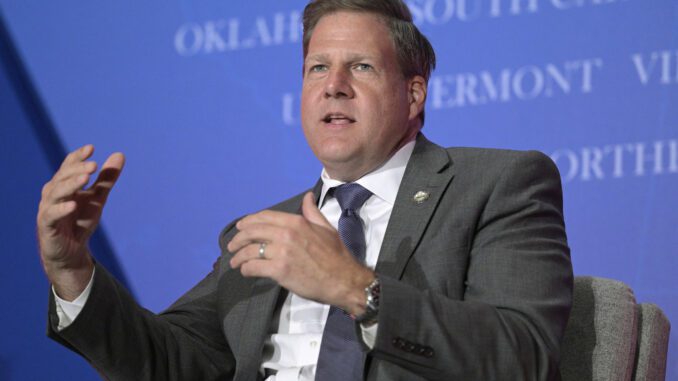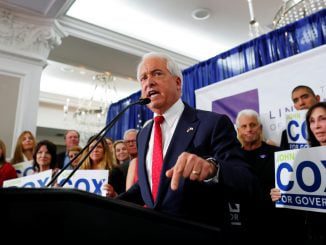
Gov. Chris Sununu (R-N.H.) is not running for president. In his state’s first-in-the-nation primary, “I can be more effective for the Republican Party in ways few other leaders can,” he wrote in the Washington Post. He plans to endorse a candidate and obviously hopes to defeat former President Donald Trump, who, he argues, is a sure loser in November.
But his advice for candidates may not be helpful beyond New Hampshire. In a cheap shot at Gov. Ron DeSantis (R-Fla.), currently Trump’s strongest opponent, Sununu says Republicans “must abandon the issues that are solely made for social media headlines, such as banning books or issuing curriculum fiats to local school districts” and “should re-embrace local control.”
That makes sense in Sununu’s state, where the largest school district, Manchester, has 12,400 students and 52,000 voters. But DeSantis’ Florida and many other states have countywide school districts.
Florida’s second-largest district, Broward County, has 260,000 students and 959,000 voters. Those voters couldn’t prevent the school board and administrators from refusing to remove the Parkland mass shooter or to get the police to enter the building and stop the killing. DeSantis had to take over and fire those responsible and is now backing school board candidates around the state.
Another difference: Some 54% of Sununu’s New Hampshire’s Republican primary electorate in 2016 were college graduates, wary of proposals that liberal media cast as intolerant. But the state isn’t typical in this regard. According to 2020 and 2022 exit polls, some 62% of Republican voters aren’t college graduates.
And as The New York Times’ ace election analyst Nate Cohn has argued persuasively, exit polls seem to overstate the percentage of college-educated voters.
The other reason to embrace issues Sununu dismisses as “solely made for social media headlines” is that, properly articulated, Republican positions are in line with the broad spectrum of public opinion while only handfuls embrace many Biden administration positions.
Should pornographic books be available in kindergarten through third grade classrooms or libraries? That’s what DeSantis’ bill, mislabeled as “Don’t Say Gay,” requires. How many voters disagree?
Should teenagers under 18 get government aid for irreversible surgeries such as breast removal without parental consent? That’s what the Biden administration is encouraging as “gender-affirming care.” How many voters back that?
And what about gas stoves? Last February, Senate Majority Leader Chuck Schumer (D-N.Y.) scoffed that “nobody is taking away your gas stove.” Then, in May, New York’s legislature and Gov. Kathy Hochul passed a bill banning gas stoves in new construction. The law is based on an environmentalist study that the Washington Post’s Megan McArdle labeled as “less-than-rock-solid evidence,” including, as National Review’s Noah Rothman writes, testing gas cooking in an “airtight” room sealed by “clear plastic sheets.”
As Rothman notes, liberal Democrats are going after affordable conveniences many rely on, including gas furnaces and hot water heaters, air conditioners, dishwashers and gas-powered lawn mowers. And don’t get them started on washer-dryer units that leave clothes soggy as European units do.
Then there are the Biden administration policies intended to force people into electric cars. Little attention is given to vast amounts of exotic minerals such as lithium produced in China or other faraway countries.
Green New Deal enthusiasts in and out of the Biden administration blithely assume that thousands of electric charging stations will spring up and charge your e-vehicle in minutes and that we’ll be able to produce the near-doubling of electricity production needed for a mostly electric car fleet. It won’t be easy with environmentalists bringing lawsuits to stop transmission lines from bringing electricity from high-wind areas to high-population areas.
Harder heads are dubious. In 2022, Warren Buffett, a Biden supporter, expressed doubts the United States was close to moving away from dependency on oil. “If we were to try and change over, in three years, or five years, nobody knows what would happen, but the odds that it would work well are extremely low, it seems to me.” He’s putting his money lately into oil and fossil fuels.
Similarly, Vaclav Smil, the premier historian and analyst of technology, writes in his 2022 book “How the World Really Works,” “Complete decarbonization of the global economy by 2050 is now conceivable only at the cost of unthinkable global economic retreat, or as a result of extraordinarily rapid transformations relying on near-miraculous technical advances.”
As Smil notes, the “four material pillars” of our civilization — cement, steel, plastics and ammonia (for fertilizers necessary to feed 8 billion people) — all require huge inputs of fossil fuels, and there are no substitutes for them on the horizon.
College graduate voters, in New Hampshire and elsewhere, may not like hearing that their green dreams are just dreams. But most people can be convinced they are nightmares to be avoided.
Michael Barone is a senior political analyst for the Washington Examiner, resident fellow at the American Enterprise Institute and longtime co-author of The Almanac of American Politics.



